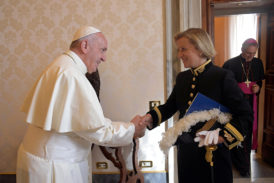By Elise Harris
ROME (Crux) – Sally Axworthy, the British ambassador to the Holy See and a supporter of women in leadership, has said she believes the Vatican is making progress and finds the Catholic Church, particularly women religious, to be a key partner in fighting plagues such as slavery and human trafficking.

In an interview with Crux, Axworthy said that in her experience, “you hear a lot about women in the Holy See, so I think it’s an issue that people are thinking about … and how they can address it.”
Noting how Vatican mechanisms for decision-making are different than a traditional government, and that change often takes longer to achieve, she said this is in part because the Holy See doesn’t have the pressure of election cycles and they aren’t forced to “cram things into a short space of time.”
However, the topic of women’s empowerment and the need for an increase in women in leadership is, in her view, “definitely an issue that’s on the table,” especially when it comes to key points of collaboration between the British government and the Holy See such as the fight against slavery, human trafficking and sexual violence in conflict.
Axworthy said that in her two years in Rome, she has been “very struck” by the contribution of women religious, who “seem to be very responsive” to the needs of the people in the places they’re in.
“If there’s a global problem, you usually find the religious sisters there at the sharp ends, whether it’s migrants and refugees, victims of sexual violence in conflict, or victims of human trafficking and modern slavery,” she said. And while religious men are also involved, “there are more religious sisters, they’re the ones who are responding.”
Axworthy, who is not Catholic, said when she came to the Vatican, she was surprised by how active the sisters are, and has enjoyed working with them on projects to prevent sexual violence in conflict zones such as the Democratic Republic of the Congo and South Sudan.
“They bring the pastoral expertise, and we’ve brought expertise on the international legal framework for combatting war crimes, so that’s a nice fit between our two strengths,” she said, adding that “there are some really good synergies with them and what they do, and that’s a key part of how we work as an embassy.”
In June 2018, Sister Imelda Poole of the Institute of the Blessed Virgin Mary and president of the RENATE anti-trafficking network, was made a Member of the Order of the British Empire in the Queen’s Birthday Honors for her efforts to fight modern slavery, illustrating ties between the British government and Catholic women religious, especially on issues related to human rights.
Speaking about the recent Oct. 3-28 Synod of Bishops on young people, during which a large portion of the discussion was dedicated to the role of women, Axworthy said she found the women present either as delegates for their orders, or as experts in the field of youth ministry, to be active and engaged.
“They had a lot to bring and contributed their own knowledge. They were very articulate, so they’d obviously made a big contribution to that synod,” she said, adding that “it was an instance of women making a contribution to something which in the past had been very male-dominated, and feeling very engaged and empowered by that experience.”
While the gathering was mainly an in-house Church discussion, Axworthy said she and other embassies followed the synod discussion closely, because they are interested in what the big issues are for the Vatican, and how it develops relations internationally.
In her view, the reflections on women in particular “were great in the synod. There was some really clear language in there, which is encouraging.”
Axworthy, who hosted a Nov. 6 event marking the 50th anniversary of the Vatican newspaper L’Osservatore Romano’s English edition, also voiced appreciation for the paper’s monthly edition dedicated to women, Donne, Chiesa, Mondo.
Headed by Italian journalist Lucetta Scaraffia, the women’s edition is not afraid to tackle more sensitive topics, Axworthy said, recalling how shortly after her arrival on the Vatican scene, the paper ran an article written by Baroness Joyce Ann Anelay on sexual violence in conflict.
“This is quite a difficult issue. It’s one that the UK campaigns on, but it hadn’t had so much attention I don’t think in the Holy See community,” Axworthy said, noting that the paper immediately said yes to running the piece. “They push the boundaries a little bit, but in a very good way.”
Speaking of UK policies which seek to empower women, Axworthy noted that several of these intersect with Vatican interests, including campaigns directed at ending sexual violence in conflict and human trafficking, as well as a major one-day conference with women in parliament happening this week in London, and which will be attended by women from all over the world.
“We have a whole range of policies that support women’s empowerment, but women’s leadership as well,” she said, adding that in her view, the policies are a reflection of the journey the British government and foreign ministry have taken on the women’s issue, and the progress they have made.
Noting how when she joined the diplomatic service 30 years ago, just a few women occupied senior positions, but she said “now there are more. It’s not 50/50, but it’s more, and it’s a journey,” adding that she is “very interested in how the Church addresses their own journey on women in leadership and I follow it closely.”
Although the UK has perhaps taken more steps to get women into leadership, even their own process is “recent history,” Axworthy said. “It’s within the last generation that the role of women has changed, so it’s interesting to have a dialogue on that even though we’re in slightly different places.”
